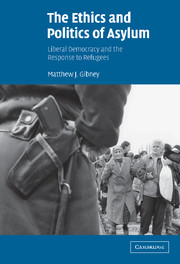Book contents
- Frontmatter
- Contents
- Acknowledgements
- Introduction
- 1 Partiality: community, citizenship and the defence of closure
- 2 Impartiality: freedom, equality and open borders
- 3 The Federal Republic of Germany: the rise and fall of a right to asylum
- 4 The United Kingdom: the value of asylum
- 5 The United States: the making and breaking of a refugee consensus
- 6 Australia: restricting asylum, resettling refugees
- 7 From ideal to non-ideal theory: reckoning with the state, politics and consequences
- 8 Liberal democratic states and ethically defensible asylum practices
- List of references
- Index
8 - Liberal democratic states and ethically defensible asylum practices
Published online by Cambridge University Press: 22 September 2009
- Frontmatter
- Contents
- Acknowledgements
- Introduction
- 1 Partiality: community, citizenship and the defence of closure
- 2 Impartiality: freedom, equality and open borders
- 3 The Federal Republic of Germany: the rise and fall of a right to asylum
- 4 The United Kingdom: the value of asylum
- 5 The United States: the making and breaking of a refugee consensus
- 6 Australia: restricting asylum, resettling refugees
- 7 From ideal to non-ideal theory: reckoning with the state, politics and consequences
- 8 Liberal democratic states and ethically defensible asylum practices
- List of references
- Index
Summary
For such things homelessness is ours
And shall be others'. Tenement roofs and towers
Will fall upon the kind and the unkind
Without election,
For deaf and blind
Is rejection bred by rejection
Breeding rejection,
And where no counsel is what will be will be.
We must shape here a new philosophy.
Edwin Muir, The Refugees 1960If the provision of protection for refugees is its central goal, then the system of asylum offered by Western states is currently in deep crisis. Over the last few decades, liberal democratic states have put in place barrier after barrier to prevent the arrival of rising numbers of refugees, as well as individuals on the move to escape grinding poverty or lack of opportunity. These barriers may well be justified in order to prevent the arrival of economic migrants, but they also halt the movement and punish the entry of those fleeing persecution and great danger. Perversely, that some lucky individuals manage to slip through the net of restrictions and ultimately gain refugee status (or some other form of protection) is taken as evidence by governments that the institution of asylum is alive and well; or, just as erroneously, that their ethical (and legal) responsibilities to assist refugees are being met. Yet the current response of Western states to refugees and asylum seekers is characterised by a kind of ‘organized hypocrisy’.
- Type
- Chapter
- Information
- The Ethics and Politics of AsylumLiberal Democracy and the Response to Refugees, pp. 229 - 260Publisher: Cambridge University PressPrint publication year: 2004



